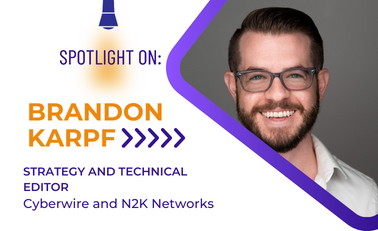
“Don’t take life too seriously. You’ll never get out of it alive.”
I got interested in cyber by learning about the Stuxnet worm. The thought that well-designed code could cause physical damage to a machine captured my imagination. I was in school as a control systems engineer at the time – building hardware/software systems to accomplish a physical task – and my entire frame of reference flipped. Everything I built could be attacked.
I wanted to learn how and why they were vulnerable, and how to protect them. That led me down a path of learning the technical and policy sides of cyber and data privacy, getting hands-on experience in the US Intelligence Community and Navy doing cyber operations, teaching cybersecurity at the undergraduate and graduate levels, and now to my role at CyberWire and N2K Networks helping security professionals truly excel in their mission.
The experience that helped me transition to a career in cyber was being a teacher.
A huge part of cyber, regardless of your role, is about good communications. A lot of what we do scares people. They think it’s technical, academic, and folks tend to shy away from anything that reminds them of grade school. Being able to break down complex concepts into something easy-to-understand is so fundamental to having a good career in cyber. It doesn’t matter what you do in cyber – you need to be able to teach.
The biggest influencers in my life were my Sailors when I was a naval officer. They made the job worth doing. I learned more from them than anyone else in my life. I still do whenever I speak to one of them today. They collectively influenced my life more than anything. From the bottom of my heart, I love them all.
I think cyber makes a great career choice for VETS because the cyber industry is as close as you can get to the mission-oriented and career-diversity of the military. No matter what part of the industry you’re involved in, cybersecurity has a tangible and measurable mission. There are bad guys.
There are also as many paths and work roles in cyber as there are MOSs/Rates in the military. The cyber industry has every job imaginable, and every industry has cyber jobs. It’s the widest door you’ll ever walk through. The opportunities are endless. Most of us leaving the military have skills a mile wide and an inch deep. That gives us a strong toolkit to dive into the cyber industry and not just tread water, but excel, even with little to no cyber experience.
My advice for VETS considering a career in cyber is to talk to as many people in the industry as possible and in as many different work roles as you can find. When people think “cyber” they often think “coding; hacking; incident response.” That’s an important part of the community, but only a small portion. The paths and roles are legion. Explore them all and find where you fit best.
My advice to VETS in planning a successful transition to a career in cyber is to always be learning. Find trustworthy information sources and make them a part of your every day. You won’t be successful in cyber unless you’re learning, growing, and staying at the peak of the knowledge curve. This industry changes fast and staying on top is a lot of work. But it’s worth it, and that makes it fun as well as rewarding.
The skill or attribute that set me up for success is natural curiosity, a deep love of learning, and a wicked bias for action. Cyber changes fast. The world changes faster.
To be successful, you need to stay at the cutting edge and make decisions fast. If that doesn’t come naturally, good news! They’re both skills that you can practice and refine.
I would tell my younger self – Everything doesn’t have to be a fight.
My true calling would be Working with my hands to create. That expresses itself in the garden, in the kitchen, and in the woodshop.
A favorite place of mine is Home. I’m a homebody and a classic introvert. I love my home.
My recommended read is Dune by Frank Herbert. It’s the ultimate sci-fi.
The whole point of sci-fi is to engage with complicated topics in a format that’s fun, interesting, and low stakes. Dune is the ultimate example of this. It’s a political thriller, a treatise on economics, culture, religion, and environmentalism, an exploration of leadership, and a critique of humankind’s intrinsic sadism.
The quote I live by is “Don’t take life too seriously. You’ll never get out of it alive.”